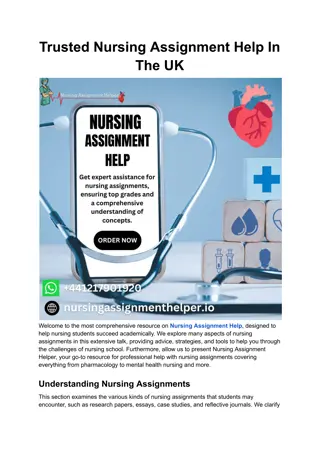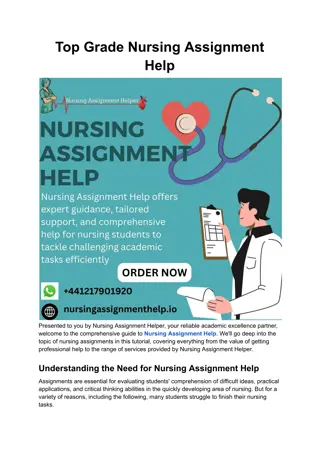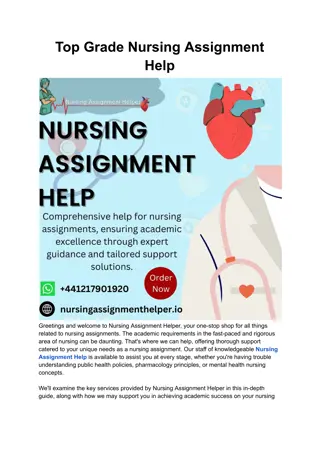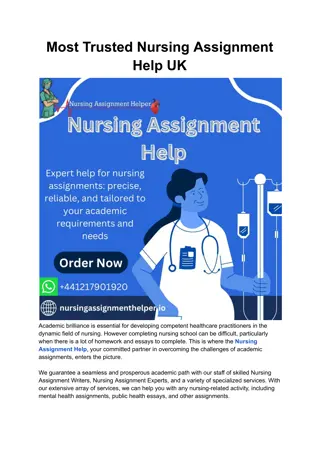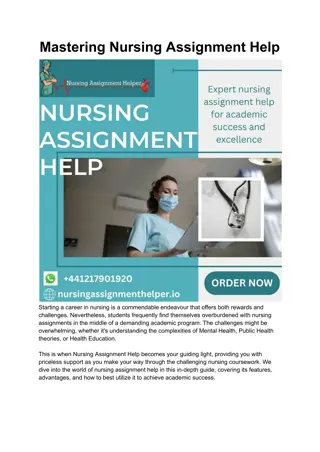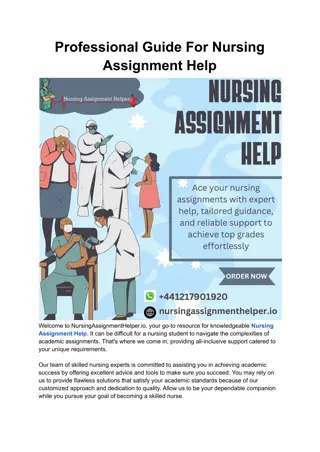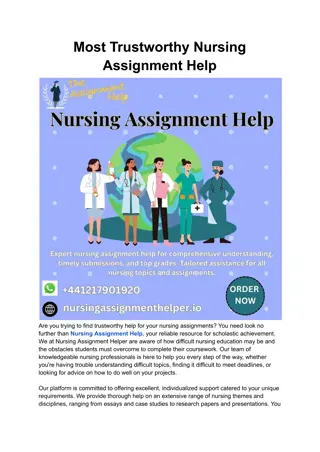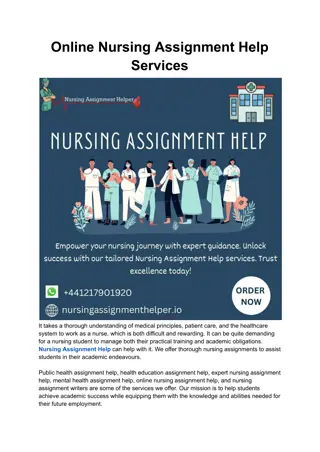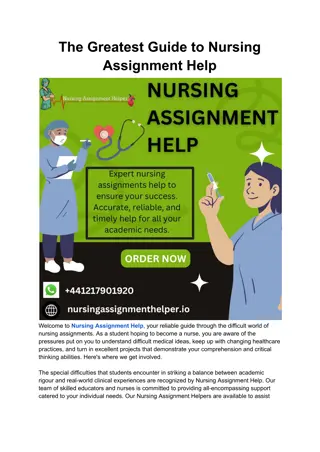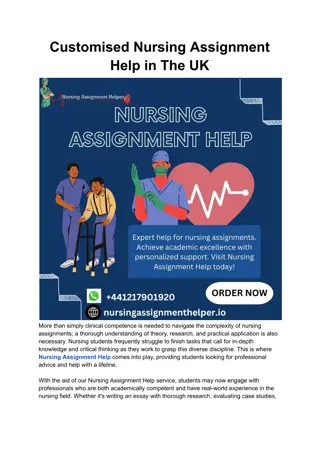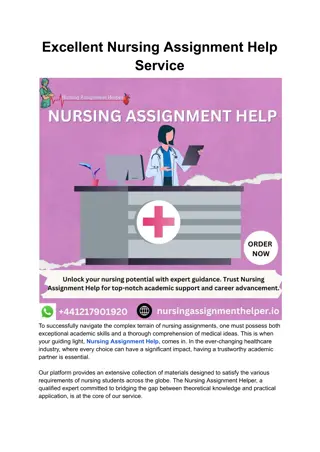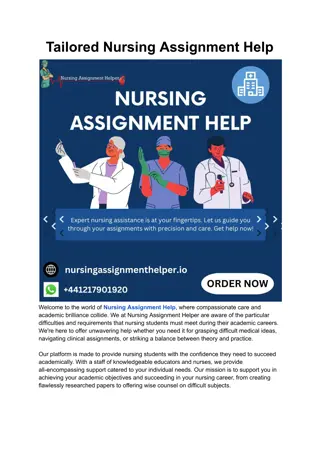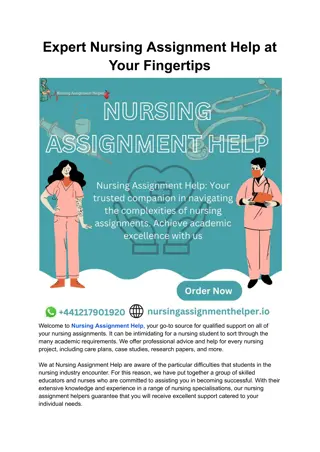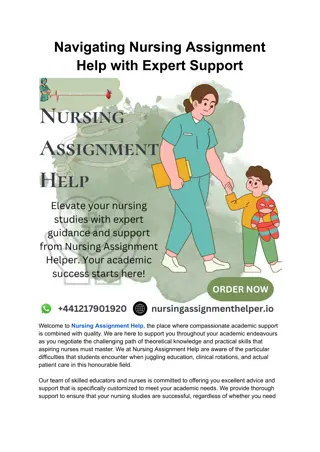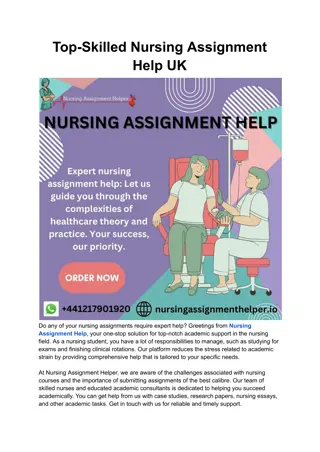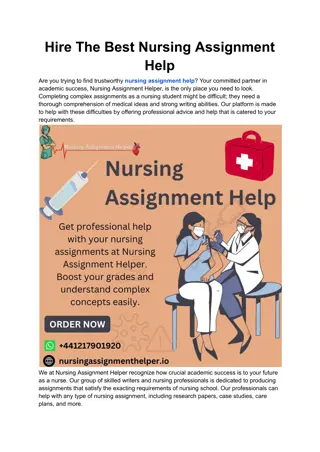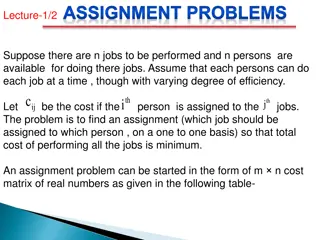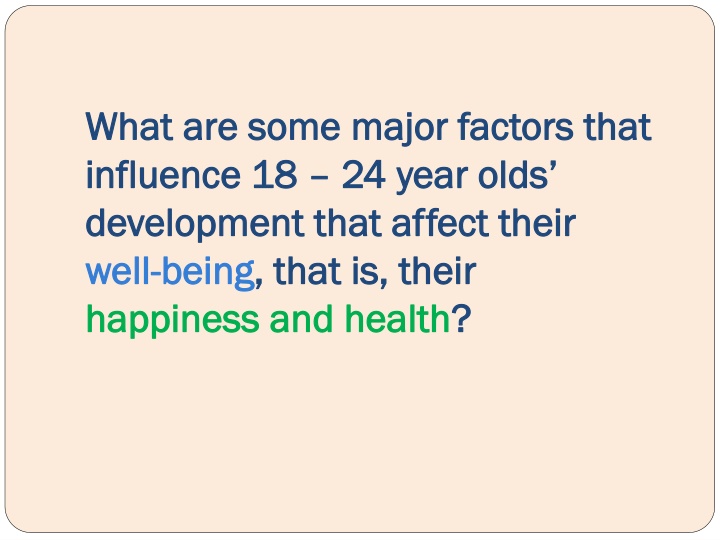
Factors Influencing Well-Being and Development of 18-24 Year-Olds
Explore the major factors that influence the happiness and health of 18-24-year-olds, impacting their overall well-being. Topics include psychological, social, and physiological factors and their interrelation in human development. Discover how these factors affect students' well-being and learn to enhance learning through appropriate social skills.
Download Presentation

Please find below an Image/Link to download the presentation.
The content on the website is provided AS IS for your information and personal use only. It may not be sold, licensed, or shared on other websites without obtaining consent from the author. If you encounter any issues during the download, it is possible that the publisher has removed the file from their server.
You are allowed to download the files provided on this website for personal or commercial use, subject to the condition that they are used lawfully. All files are the property of their respective owners.
The content on the website is provided AS IS for your information and personal use only. It may not be sold, licensed, or shared on other websites without obtaining consent from the author.
E N D
Presentation Transcript
What are some major factors that What are some major factors that influence 18 influence 18 24 year olds 24 year olds development that affect their development that affect their well well- -being being, that is, their , that is, their happiness and health happiness and health? ?
Area E and ENGR 10 Assignments Factors in College Student Development
SJSU General Education Area A Basic Skills (9 units) Area B Science & Math (9 units) Area C Humanities & Arts (9 units) Area D Social Sciences (9 units) Area E Human Understanding & Development (3 units) SJSU Studies (12 units)
Area E Area E SJSU General Education SJSU General Education http://info.sjsu.edu/web-dbgen/narr/static/schedules/general-education-corege.html
Course Goals GE Area E At the end of this course students will be able to identify the: Psychological (Cognitive/Emotional) Social Physiological factors and their interrelation on human development and recognize how: Those factors and their interrelationinfluence a student s well-being A student s well-being is affected by the university s academic and social systems To use appropriate social skills to enhance learning and develop positive interpersonal relationships
How Area E is Achieved ..... How Area E is Achieved ..... Research Paper 1000-1500 word research paper Factors influencing Emerging Adults Work with diverse groups and individuals in Labs Teamwork Develop strategies for one s well-being Explore university resources Reflections Robot Paper Paper recognizing factors on development across the lifespan from the perspective of designing a robot
How Old Are You? A) Younger than 18 B) 18-20 C) 21-25 D) 25-30 E) Older than 30
Are you an adult? Are you an adult? Do you feel you have reached adulthood? A. Yes B. No C. In some ways yes, in some ways no
What the public thinks What the public thinks
What makes you an adult? What makes you an adult? Which of the following do you think is most important for becoming an adult? A. Making independent decisions B. Accepting responsibility for yourself C. Getting Married D. Becoming financially independent E. Finishing your education Arnett Arnett Arnett
What the public thinks What the public thinks
Developmental Periods Developmental Periods Today, - Live with parents or - Cohabitate - Children later, and less - Education prolonged - Changing jobs - Peers role model infancy In 1970, 21 year old - Married - New born - Education complete - In long term job - Parents role model early childhood middle childhood adolescence emerging adulthood young adulthood 18-25 years old adulthood late adulthood Arnett s Model Emerging Adulthood Young Adulthood Middle Adulthood Late Adolescence Adulthood
What are the Characteristics of What are the Characteristics of Emerging Adults? Emerging Adults? Exploring identities Instability (work, romance, residence) Focusing on self as independent Believe themselves between adolescent & adult Believe life holds many possibilities NOT Universal LOTS of variation
Peak Attractiveness Peak Attractiveness https://www.quora.com/At-what-age-is-peak-physical-attractiveness-for-women
Believe life holds many possibilities Depressive Symptons Decline Arnett, J. J. (2007). Emerging adulthood: What is it, and what is it good for?.Child development perspectives,1(2), 68-73.
Believe life holds many possibilities Self-Esteem Rises Arnett, J. J. (2007). Emerging adulthood: What is it, and what is it good for?.Child development perspectives,1(2), 68-73.
Key Areas of Human Development Key Areas of Human Development The Mind Emotions Social Physical Across All Stages of Human Development Across All Stages of Human Development
Key Areas of Human Development Key Areas of Human Development Cognitive Emotions Social Physical Across All Stages of Human Development Across All Stages of Human Development
Key Areas of Human Development Key Areas of Human Development Psychological Cognitive Emotions Social Physical Across All Stages of Human Development Across All Stages of Human Development
Major Areas of Development Major Areas of Development Psychological (Cognitive) Thinking, learning, understanding, gaining knowledge, memory, language, perceiving; ideas; beliefs; attitudes; identity formation; etc. Psychological (Emotional) Self-esteem; pride; shame; sympathy; empathy; mental health; stress; anxiety; happiness; anger; hopelessness; etc. Relationships with family; significant others; peers; classmates; professors; interactions with others; group memberships and activities; cultural relationships; etc. Social Health (such as: high blood pressure, high cholesterol, STDs/HIV/AIDS); fitness; nutrition; physical activities; etc. Physiological
Key Areas of Human Development Key Areas of Human Development Domains Psychological Social Physical
Factors That Affect Development Factors That Affect Development Nature or Nurture Psychological Nature or Nurture Social Nature or Nurture Physical
Student Development Paper Student Development Paper Your paper will examine development in all three development domains (psychological, social, physiological) during emerging adulthood for a specific topic of your choosing (see examples). You must cover the same topic in all three domains 1000-1500 word research paper not including reference list
Factors That Affect Development in Factors That Affect Development in Emerging Adults Emerging Adults Topic Domain What does the research say? Psychological Depression What does the research say? Social Depression What does the research say? Depression Physiological
Factors That Affect Development in Factors That Affect Development in Emerging Adults Emerging Adults Topic Domain What does the research say? Psychological Drugs What does the research say? Social Drugs What does the research say? Drugs Physiological
Factors That Affect Development in Factors That Affect Development in Emerging Adults Emerging Adults Topic Domain Hooking Up What does the research say? Psychological Hooking Up What does the research say? Social Hooking Up What does the research say? Physiological
Factors That Affect Development in Factors That Affect Development in Emerging Adults Emerging Adults Topic Domain What does the research say? Psychological Anxiety What does the research say? Social Anxiety What does the research say? Anxiety Physiological
Student Development Paper Student Development Paper Assignment Preparation Watch video by Dr. Maureen Smith Review Paper Guidelines and Rubric Review Audio Lectures and Videos Choose Topic (Examples in Canvas) Read and Find Peer-Reviewed Articles Write Outline, Bring to Class for Review Write Paper and Upload to Canvas
Materials in Canvas Materials in Canvas Paper Guidelines Suggested Topics for the paper Rubric for Grading Paper Audio Lectures Lifespan Development and Area E (21 minutes) Emerging Adulthood (29 minutes) General Issues in College Student Development (20 minutes) College Student Developmental in the Context of Developmental Domains (40 minutes) Paper-overview and how to find the references (15 minutes) Quizzes Emerging Adulthood quiz (due last night) Take Lifespan Development quiz. Take the College Student Development quiz
Materials in Canvas Materials in Canvas - - Modules Modules
Materials in Canvas Materials in Canvas - - Assignments Assignments
Important Dates Important Dates Learn about Lifespan Development and Emerging Adulthood Watch: Lifespan Development and Area E (video 21 minutes) Watch: Emerging Adulthood (video 29 minutes) Watch: Interview with Jeffrey Arnett (video 15 minutes) Take Lifespan Development quiz. Mar 6 Learn about College Student Development Read the four research articles* (see 2nd slide from this one) Watch: General Issues in College Student Development (video 20 minutes) Watch: College Student Developmental in the Context of Developmental Domains (video 40 minutes) Take the College Student Development quiz Mar 11
Important Dates ( Important Dates (cont cont) ) College Student Development Paper Outline and References Watch: How to Find References that explains how to find the references (video 22 minutes) Upload outline (including references) in Canvas Mar 15 Bring paper copy of outline to class Mar 16 College Student Development Paper Due Mar 22 (NO LATE PAPERS) Use Emerging Adulthood Paper Template Upload file to Canvas, Mac users upload .pdf
Preview the document *College Student Development Research Articles *College Student Development Research Articles Read the following articles Burgess, S. R., Stermer, S., & Burgess, M. R. (2012). Video game playing and academic performance in college students.College Student Journal,46(2), 376-387 PDF Link Conley, K. M., & Lehman, B. J. (2012). Test anxiety and cardiovascular responses to daily academic stressors.Stress And Health: Journal Of The International Society For The Investigation Of Stress,28(1), 41-50. doi:10.1002/smi.1399 PDF Link Holman, A., & Sillars, A. (2012). Talk about 'hooking up': The influence of college student social networks on nonrelationship sex.Health Communication,27(2), 205-216. doi:10.1080/10410236.2011.575540 PDF Link Zawadzki, M. J., Graham, J. E., & Gerin, W. (2013). Rumination and anxiety mediate the effect of loneliness on depressed mood and sleep quality in college students.Health Psychology,32(2), 212-222. doi:10.1037/a0029007 PDF Link
*College Student Development Research Articles *College Student Development Research Articles Read the following four articles: Burgess, S. R., Stermer, S., & Burgess, M. R. (2012). Video game playing and academic performance in college students. College Student Journal, 46(2), 376-387 (PDF Link ) Conley, K. M., & Lehman, B. J. (2012). Test anxiety and cardiovascular responses to daily academic stressors. Stress and Health: Journal of the International Society for the Investigation of Stress, 28(1), 41-50. doi:10.1002/smi.1399 (PDF Link ) Holman, A., & Sillars, A. (2012). Talk about 'hooking up': The influence of college student social networks on nonrelationship sex. Health Communication, 27(2), 205- 216. doi:10.1080/10410236.2011.575540 (PDF Link ) Zawadzki, M. J., Graham, J. E., & Gerin, W. (2013). Rumination and anxiety mediate the effect of loneliness on depressed mood and sleep quality in college students. Health Psychology, 32(2), 212-222. doi:10.1037/a0029007 (PDF Link )
Components and Order of Paper Components and Order of Paper Sections must be clearly labeled (use template) Introduction/Topic Psychological Domain Social Domain Physiological Domain Conclusion References Domain sections should be 2 to 3 paragraphs
Paper Template (find in Canvas) Paper Template (find in Canvas) Name: ID Number: Introduction and Topic Psychological Domain Social Domain Physiology Domain Conclusion Reference List
Components of Paper Components of Paper Introduction Defines emerging adulthood Clearly identifies the topic (see examples) States a position about the topic (neutral, positive or negative) Provides background information about how the topic impacts emerging adulthood Provides an overview of what the paper will do and cover
Sample Topics ( Sample Topics (in Modules) ) Choose ONE One that you can find references for
Components of Paper Components of Paper For Each Domain Provides information about the domain in the context of the topic Introduces and cites study (in APA format) related to the domain Provides relevant results of the study Sums up key points, integrates the key findings, transitions to next domain
Components of Paper Components of Paper Conclusion Provides overview of the key points of the paper Provides insights about the topic w/respect to the position taken or what did YOU learn, if anything Discusses implications for current development and the transition to later development for the ways the four developmental domains inter-relate.
Peer Peer- -Reviewed Articles Reviewed Articles Sometimes called refereed or scholarly articles Written by experts and reviewed by other experts in the field Limit database search to peer-reviewed journals only Check database Ulrichsweb.com to determine if journal is peer-reviewed Check actual journal (the physical version) Visit PsychInfo (database in MLK Library); LibGuide for Child and Adolescent Development Google Scholar https://library.sjsu.edu/video/finding-scholarly-peer- reviewed-articles
Components of Paper Components of Paper Reference List List of all the articles cited in paper Must be in APA style format
APA Style for References APA Style for References Journal article Burgess, S. R., Stermer, S., & Burgess, M. R. (2012). Video game playing and academic performance in college students. College Student Journal,46(2), 376-387. Conference Paper Smith, M. E., Nguyen, D. T., Lai, C., Leshed, G., & Baumer, E. P. (2012, February). Going to college and staying connected: Communication between college freshmen and their parents. In Proceedings of the ACM 2012 conference on Computer Supported Cooperative Work (pp. 789-798). ACM. Book Arnett, J. J. (2004). Emerging adulthood: The winding road from the late teens through the twenties. Oxford University Press.
References must be alphabetized References must be alphabetized Conley, K. M., & Lehman, B. J. (2012). Test anxiety and cardiovascular responses to daily academic stressors.Stress And Health: Journal Of The International Society For The Investigation Of Stress,28(1), 41-50. doi:10.1002/smi.1399 Emerging adulthood and early adulthood. (2013, December 23). In Wikipedia, The Free Encyclopedia. Retrieved April 14, 2014, from http://en.wikipedia.org/w/index.php?title= Emerging_adulthood_and_early_adulthood&oldid=587320746 Holman, A., & Sillars, A. (2012). Talk about 'hooking up': The influence of college student social networks on nonrelationship sex.Health Communication,27(2), 205-216. doi:10.1080/10410236.2011.575540 Jayson, S. (2012, July 30). Many 'emerging adults' 18-29 are not there yet. USA Today. Retrieved from http://usatoday30.usatoday.com/
Example Example Topic: Anxiety Introduction Emerging adulthood is . Highanxiety in emerging adults negatively affects a student s overall well-being This paper will examine the effects of high anxiety on emerging adults . Domains: What does the research say for each domain? Psychological: Impact to memory? Affect short or long term learning? Depression? Distress? Mental health issues? Social: Lack relationships? Create dependencies? Physical: High blood pressure? Headaches? Fatigue? Impact to overall fitness?
Example Example Topic Reference Psychological Domain Too much anxiety can negatively affect students test scores (Warecki, 2012). The study found that those students who identified themselves as generally anxious to very anxious had test scores 10% to 15% lower than those students who reported they had no anxiety or minimal anxiety when taking a test. Those that did report having higher anxiety cited short term memory problems as a major reason. Results of Study [Another paragraph] The study also points out that this may lead to an increase in anxiety which can possibly lead to possible anti-social issues. The last sentence is a transition to the next domain - Social

